Hell is Adaptations: Cloud Atlas
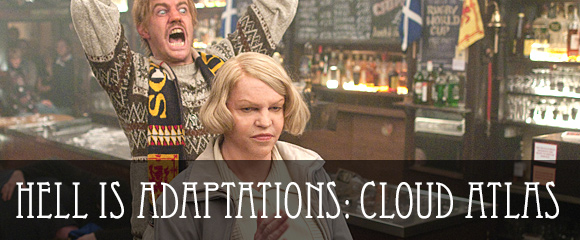
When British writer David Mitchell published Cloud Atlas, the novel struck the reading public as a daring, multilayered work. It was a critical and commercial success, yet seemed impossible to adapt to the big screen. Yet as the story goes, Nathalie Portman shared her love for the novel with the Wachowskis during the filming of V for Vendetta, and the two siblings determined to do the impossible, and bring the book to the big screen.
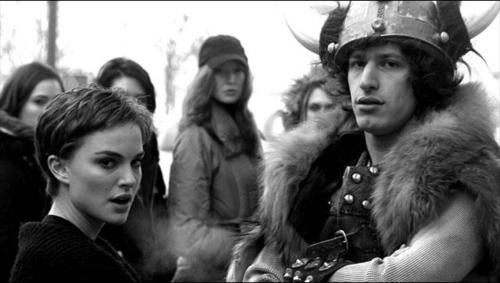
Photo from the script meeting.
As a book, Cloud Atlas owns its success to a number of devices that are impossible to translate into a movie. The novel is composed of six novellas, which are very loosely interconnected through themes of destiny and reincarnation. Each novella was written in a distinct literary style, and together they showcase Mitchell’s incredible diversity. They range from nineteenth century sea journals, to a detective story, a comedy of manners, and a biopunk Korea. Each features a unique voice and style, and is incredibly well-written; yet somehow they work as a whole through subtle use of themes and textures.
Even more surprising, all these stories are told in the form of a Matryoshka doll, starting with the earlier story and progressing chronologically, then going back in time once the central tale is over. The structure might sound gimmicky on paper, but in Mitchell’s hands it works as a beautiful thematic explorations on the ripples our actions send backward and forward in time.
How could Tom Tykwer (Run Lola Run) and the Wachowskis ever hope to take such a complex and nuanced piece of literature, and turn it into a Hollywood blockbuster? These guys, as great as they are, are not masters of nuance. Yes, they can craft exciting, pulse-pounding set pieces, but even their more subversive works (say, the Wachowskis’ V for Vendetta,) they typically dismiss finesse for visual impact.
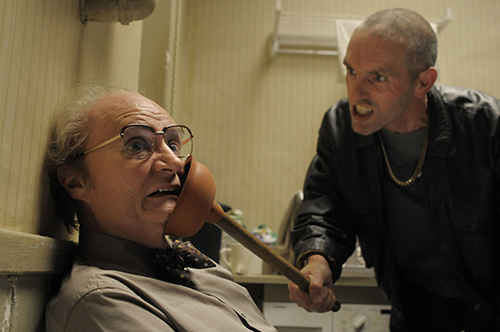
“Finesse.”
It’s a huge surprise, then, that the movie, on the whole, works pretty well. The Cloud Atlas movie does indeed stand on its own as a complex, ambitious piece of filmmaking. The critics have been polarized by the movie, with some calling it pure inspired genius, while others have called it cinematic hubris. It’s worth noting that the movie is complex only in comparison to the usual Hollywood fare; compared to the book, it’s pretty simplistic and is often too on the nose with its message of the interconnectivity of all lives.
The director trio did away with the Matryoshka doll structure of the book, which must have been a hard decision but ultimately was the right one. The story flows between time periods, tied together by clever cliffhangers and thematic transitions. It’s an impressive achievement that they directors managed to pull together six different stories spanning across centuries, and managed to fit them together into a coherent whole. The movie works, and we slowly care for what happens in each time period.
Where the movie fails is in its absurd casting stunt. Although the book doesn’t call for it at all, the directors have chosen to cast most of its main and secondary actors in multiple roles across the six timelines. Thus, for instance, we get Tom Hanks playing a villainous doctor, a kind hotelier, a nerdy scientist, and a post-apocalyptic tribesman. The various characters played by a given actor do not share a common thematic thread, except perhaps for Hugo Weaving’s antagonists. To complicate matters, there is a clear protagonist to each story, marked by a comet birthmark, and that character gets played by five different actors.
The casting gets much worse. When we hit futuristic Seoul, the only characters played by actual Koreans are the women, including Doona Bae as Somni-451. As a matter of fact, one of the clones is played by Xun Zhou, a Chinese actress. Almost all the men are played by Westerners in ridiculous yellowface. They don’t look like Koreans for one second; they look like Star Trek extras with a botched Romulan makeup job. As the story goes, Nathalie Portman was originally promised the role of Somni-451, which would have left the movie entirely devoid of speaking parts for Korean actors.
The movie received a lot of flak for this “racebending,” and although it seems like the directors’ intentions were innocent, the result is still an uncomfortable mess. It’s just sad that the only people played by genuine Koreans in futuristic Seoul are the women who get to be fetishized and possessed by men in yellowface. Frankly, the directors should have anticipated this problem and tried to avoid it. They spoiled an opportunity to feature an all-Asian cast doing things that are atypical of Asians in Hollywood; instead, all the bravery and villainy is left to Westerners in bad Korean makeup, while the only genuine Koreans are the sensual women clones, their visual style flirting with the Asian stereotype of the fragile concubine.
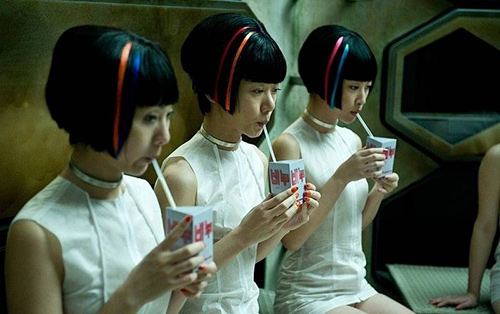
“Finesse.”
Then there’s the part of an overbearing female nurse played by Hugo Weaving. It’s as terrible as it sounds.
Racebending issues aside, the movie is a competent adaptation of the novel, which, in itself, is a cinematic miracle. The movie lost a lot of the complexity of the novel, and evacuated much of its nuance in favor of thematic hints that are anything but understated. Whereas the concept of karma and reincarnation was a subtle texture of the novel, here the directors hit us with it repeatedly until they hammer the point home. The story that suffers the most from the movie adaptation is that of Frobisher, the composer; gone is the family intrigue involving Vivian’s wife and daughter; gone is the subtle texture brought on by Frobisher’s homosexuality. The result is, frankly, a lot more tepid. On the other hand, the Wachowskis have brought Neo Seoul to life with gusto, in a visual style reminiscent of Bladerunner or Ghost in the Shell.
Ultimately, I’m left wondering why adapting Cloud Atlas to the big screen was necessary at all. It was clear from the get-go that the trio of directors was not going to capture the full essence of a complex, nuanced, and beautiful novel. Why go ahead anyway and create an inferior translation into a new medium? That question might explain the lukewarm fate that has faced Cloud Atlas in cinemas. Or perhaps the naysayers are right, and the movie is at once genius and hubris.
 Purchase Cloud Atlas from Amazon Instant Video
Purchase Cloud Atlas from Amazon Instant Video



















 Full Details
Full Details
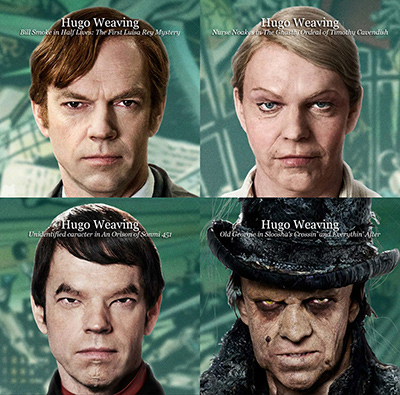


5 Comments
A pretty good article, and I admit I hadn’t considered the yellowface angle as seriously as I should have. I personally think the book would have been much better as an animated movie, where the voices could have taken over for the physical actors and made some of the yellowface/genderbending problems a little less severe. One thing I will point out is that Frobisher, in both novel and movie, is bisexual. We see him with Sixsmith and Jocasta. As a bi guy, he’s the only major bi character in a film I can think of in the past, oh, my lifetime. (if you all can think of others, please, share) Still, good stuff, and smart.
If you’re going to slam the casting choice of Western actors for playing Asian characters, you should note that not all of the Western characters are played by Westerners, either: a Chinese actor plays a British redhead. In other words, for once the mixing up goes both ways.
As a person of mixed heritage, articles like this make me glad I never became an actor, because by the logic here I would never qualify for any parts.
Kat: You’re right that not all Western characters are played by Westerners, but the overwhelmng majority are. Western Europe isn’t being represented by an all-Asian cast, for instance. Doona Bae plays a supporting character. Whereas Neo Seoul is all Westerners in yellowface. That’s not ‘going both ways.’
And I don’t understand your last comment; how does having a mixed heritage mean you wouldn’t get roles?
Daniel, because Kat wouldn’t be a pure representative of one race that’s to be portrayed?
i haven’t read the book and maybe because of that i thoroughly enjoyed the movie. i loved its multilayerness and although casting same actors for different roles looked a bit corny in the beginning it clearly carried through the idea of karma.
movies don’t work the same way as books obviously, there’s no way you can communicate the story like it’s done in the book. movies are just another way of telling the story and i’m grateful for them as long as they don’t botch it as in I, Robot. because after all there are people in our lives that don’t enjoy reading and if i wanted to share a story that i liked a movie based on the story would allow that.
Daniel, because Kat wouldn’t be a pure representative of one race that’s to be portrayed?
The issue I’m discussing here is that Hollywood has a historical tendency to cast White actors in non-White roles, thus limiting the possibilities of actors from other ethnic backgrounds. Casting people of mixed heritage is absolutely not the problem here; as a matter of fact, it’d be a step forward for Hollywood.
Interestingly, Halle Berry is of mixed heritage.
Sorry, the comment form is closed at this time.